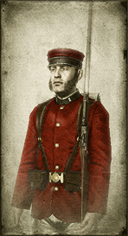
Basic Unit Statistics (can be modified by difficulty level, arts, skills, traits and retainers)
| Recruitment Cost | 1370 | |
| Upkeep Cost | 180 | |
| Melee Attack | 12 | 34% |
| Charge Bonus | 20 | 40% |
| Bonus vs Cavalry | 7 | 23% |
| Range | 125 | 19% |
| Accuracy | 70 | 70% |
| Reloading Skill | 65 | 65% |
| Ammunition | 15 | 18% |
| Melee Defence | 7 | 20% |
| Armour | 2 | 13% |
| Morale | 12 | 24% |
Strengths & Weaknesses
- Very good accuracy and reload rate.
- Good in melee.
- Very good morale.
Abilities
- Kneel Fire - The first rank of this unit will kneel to allow the first two ranks to fire simultaneously.
- Suppression Fire - This ability increases reload rate but lowers accuracy. Enemy units hit by suppression fire are slowed and suffer a morale penalty.
Requires
Description
Manning guns aboard ship or carrying a rifle ashore, Royal Marines always rise to a challenge.
These are well-trained and disciplined infantrymen carrying the latest breech-loading rifles available. They are capable of delivering accurate, withering and rapid fire on enemy units and, when they close, can give a very good account of themselves in melee. Given the traditions of the Royal Marines and the Royal Navy they also have excellent morale, making them superior quality line infantry. Royal Marines were the British Admiralty's private land-going army. Although they might look like soldiers and fight like soldiers, they were not part of the British Army. They traced their origins back to 1664, but they formally became marines in 1755. This gave them a long tradition of sea-service and, given the controlled aggression of the Royal Navy over the centuries, plenty of practice in fighting. The example of Admiral Byng's execution for not attacking the enemy made sure that Royal Navy ships would almost always attack, and that no officer would pass up an opportunity to harm an enemy. Marines were usually distributed across the whole fleet, and operated guns in sea battles, often with great skill and bravery. Ashore, they were the backbone of most expeditionary forces, and were expected to give a good account of themselves in any situation from a set-piece battle to a cutting-out raid. One peculiar quirk of the Royal Marines (and this in a navy which specialises in quirky behaviour) was the rank of Colonel of Marines. Despite the name, this was given to RN captains who did distinguished service: a nice way of boosting their pay and honouring them.